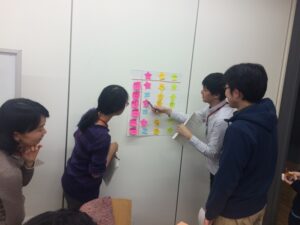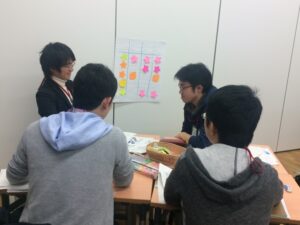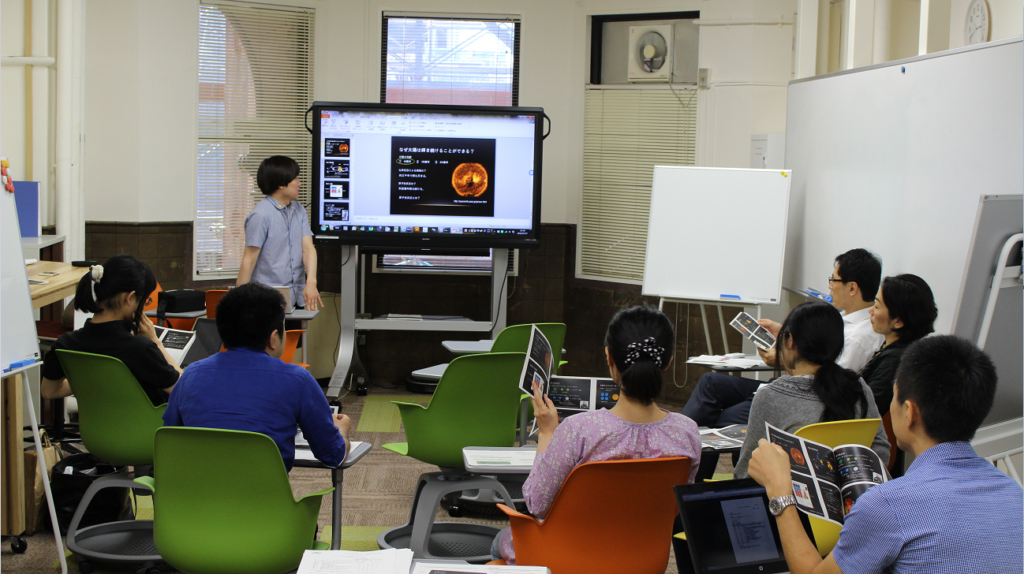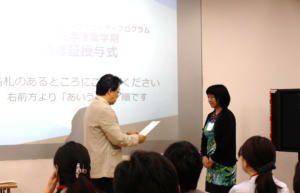Summary
We held workshops on the application documents for the JSPS fellowships on March 28th, April 10th, and 23rd, 2016.
Here we call those who create application documents “applicants,” and those who support them “mentors.”
Building on the reflection on the workshops held in AY2015, we removed the mentor meeting session to ease the burden on mentors and asked them to check one or two application documents in advance if possible.
Also, to enhance the quality of the application documents before the workshop, we provided the applicants with checksheets that gave tips on creating the documents and worksheets that helped them structure the application information and asked them to get prepared for the workshop by filling in the sheets.
The workshop proceeded in the following order: briefing, peer review, review of the application documents, mentoring, and reflection.
Teams and Groups
We made teams of one mentor and one or two applicants.
We also made groups that consist of two teams.
The peer review, described later, was conducted in groups while mentoring was conducted in teams.
Workshop Timeline
13:00–13:30 Briefing
We explained the summary and schedule of the workshop, followed by a self-introduction among the participants and comments on the tips on creating the application documents.
13:30–14:30 Peer Review
Applicants first explained their documents using the worksheet (5 min), followed by the group discussion on how to improve the documents (9 min).
Groups consisted of four applicants and two mentors in principle, so the above process was repeated four times.
They discussed focusing on the improvement of the structure and logic using the worksheet.
14:30–15:00 Review of the Application Documents
Participants read the application documents before moving on to the mentoring session.
Teams consisted of two applicants and one mentor in principle, so the mentor read the two application documents while the applicants read the other one’s document, then they examined the improvement points.
15:00–17:00 Mentoring
The applicants had a one-hour one-on-one meeting (i.e., mentoring) with the mentors on how to improve their application documents.
The other applicant listened to the mentoring and took notes on their PCs, and gave feedback as necessary.
17:00–17:30 Reflection
Participants reflected on the workshop and shared what they had learned.
Reflection on the Workshop
It was good that we were able to ease the burden on the mentors before the workshop by building on the reflection on the previous workshops.
Also, we were able to conduct the workshop efficiently by redesigning the structure.
However, most activities were carried out in groups/teams, which led to less time for sharing the information with the whole participants. There is room for improvement in that sense.
Afterword
Many applicants seemed to be satisfied with the workshop, although there is still much more to improve the event.
Mentors, too, seemed to be satisfied to share tips on how to create the application documents.
Therefore, the event was overall a success.
We would like to improve and conduct better workshops in the future based on the reflection.
(Appendix) Background of the Workshop
It is not too much to say that the research fellowship awarded by the Japan Society for the Promotion of Science (JSPS) is an important title to obtain for becoming a researcher. In fact, 80.5% of those who became research fellows entered the “full-time researcher post” according to the survey on the people five years after they had been awarded the fellowship (JSPS 2015).
Those who have prepared an application document for the research fellowship even once must have experienced how their research theme and plan became sophisticated through the process.
In that sense, I believe that the process of creating the application document itself has value, apart from becoming a research fellow.
It may be important to create the document struggling alone, but I strongly believe that sharing the wisdom in creating the document helps everyone enhance not only the quality of the document but also the quality of the research, and that is why I planned and conducted this workshop.
[Reference]
Japan Society for the Promotion of Science (2015) Tokubetsukenkyūin – DC no shūshokujōkyōchōsakekka ni tsuite [Survey result of employment opportunities for research fellows (DC)] Retrieved April 3, 2017, from https://www.jsps.go.jp/j-pd/data/pd_syusyoku/27_dcgaiyou.pdf
(Lui Yoshida, Alumnus of the 1st UTokyo FFP)









 The 4th semester of “Interactive Teaching,” a free online course run by the University of Tokyo, starts on April 27th, 2016.
The 4th semester of “Interactive Teaching,” a free online course run by the University of Tokyo, starts on April 27th, 2016.


